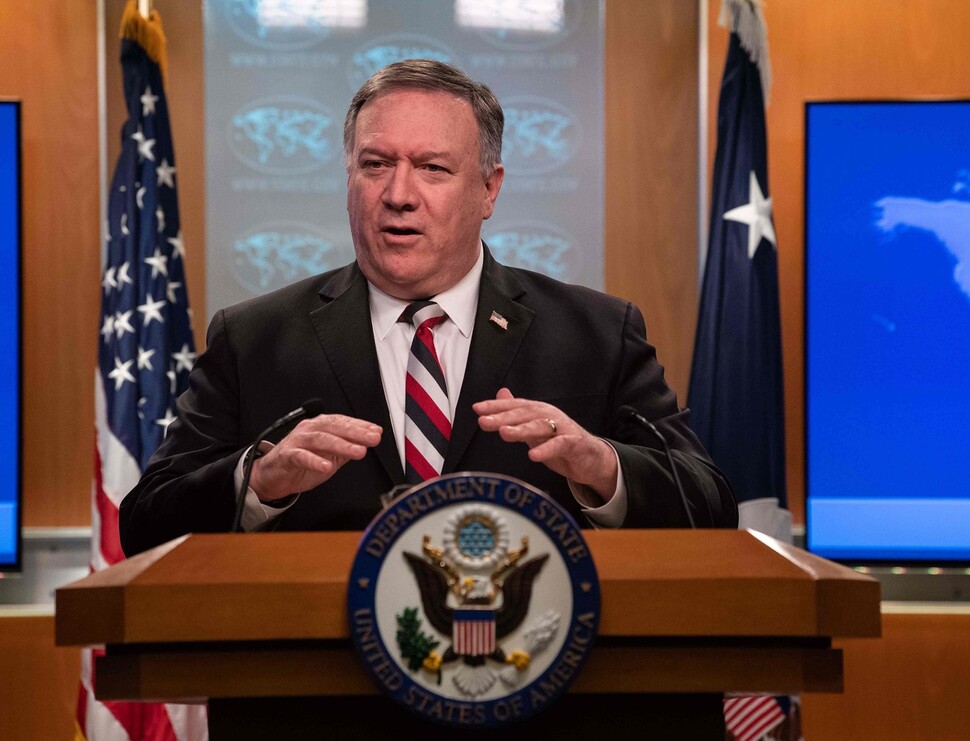Cuba redesignated as a terrorist support country… Biden’s ankle to improving relations with Cuba
Restrictions on contact with Taiwanese officials were lifted, and Huti rebels were also designated as terrorist groups.
Afghanistan’s withdrawal as scheduled, without the defense authority law

US Secretary of State Mike Pompeo. Minister Pompeo announced a statement on the 11th (local time) that Cuba was redesignated as a terrorist support country. AFP Yonhap News
President Donald Trump, who is about to retire, is driving a spike in foreign policy. These are measures to reduce the space for the next presidential administration to take office in foreign policy by Joe Biden. On the 11th (local time), the Trump administration announced measures to redesignate Cuba as a terrorist support country. The former administration of Barack Obama lifted Cuba from a terrorist country in 2015 after achieving historical normalization of diplomatic relations with Cuba in 2014. However, after taking office, the Trump administration, along with Venezuela and others, pointed out Cuba as a “triman of tyranny” and returned measures to normalize relations, and this time redesignated as a terrorist support country. President-elect Biden said he would normalize relations with Cuba again, but the Trump administration’s move puts a heavy burden on it. Trump administration officials explained that the move, which redesignated Cuba as a terrorist supporter, was due to Cuba’s support for the government of Nicholas Maduro in Venezuela, which the United States does not recognize. Secretary of State Mike Pompeo said in a statement that day, “With this measure, we are once again holding the Cuban government accountable and sending a clear message.” We have to stop applying.”

The capitol in Havana, Cuba. Havana/EPA Yonhap News
With the Trump administration backing the normalization of relations with Cuba, Democrats and the American business community have opposed Cuba’s reform and opening up. Biden has suggested easing economic and travel restrictions on Cuba. Said Cuba could be lifted from the terrorist state again after the inauguration of the Biden administration, but the process will take time. Earlier on the 9th, the Trump administration lifted restrictions on US officials from contacting Taiwanese authorities. In a statement, Secretary of State Pompeo said in a statement, “We are lifting self-regulations that have restricted US diplomats and other officials from contacting Taiwanese authorities.

Taiwan’s honor guard is giving a blue day in Taipei on the 11th. On the 9th, the Trump administration lifted restrictions on US officials from contacting Taiwanese authorities. Taipei/EPA Yonhap News
In response, Chinese Foreign Ministry spokesman Zaorizen said at a regular briefing on the 11th, “China is determined to oppose the actions of the United States and express regret.” “There is only one China in the world, and Taiwan is an inseparable part of China.” Emphasized. Unlike the Trump administration, the next administration, Biden, is stabilizing relations with China, while the pace of confrontation with China needs to be adjusted. The Trump administration’s hard-to-recover steps in the Taiwan issue, which China is most sensitive to, puts a heavy burden on the Biden administration. In addition, on the 9th, the Trump administration announced measures to define Yemen’s Huti rebels as terrorist groups despite domestic and international opposition. Minister Pompeo announced today that the Huti rebels were designated as a terrorist group as part of an operation “maximum pressure” against Iran and its allies. The Huti rebels, which are affiliated with Shi’ites like Iran, are considered an alliance of Iran. Saudi Arabia, Iran’s enemy, is intervening in the Yemeni civil war to wipe out the Huti rebels. This move was taken by the Trump administration for Saudi Arabia. This measure was taken despite bipartisan opposition by both Republicans and Democrats in the United States and opposition by the United Nations. If the Huti rebels are defined as a terrorist group, support for the refugees under their jurisdiction will be disrupted, and peace negotiations will also face difficulties. The International Relief Commission’s Secretary General, David Milliband, accused it of “complete diplomatic vandalism.” On the other hand, withdrawal from Afghanistan is also ongoing. The U.S. Department of Defense indicated on the 11th that it would adhere to the policy of last November to reduce the number of US troops stationed in Afghanistan from 4,500 to 2,500 by mid-month. In a statement that day, the Ministry of Defense said in regard to the reduction of the Afghan garrison, “a new order has not been issued that affects the progress of the reduction, which is expected to reach 2,500 by January 15, 2021.” This policy may violate the recently passed National Defense Authorization Act (NDAA). The law stipulates that budgets cannot be spent on reducing Afghan troops to less than 4,000 in fiscal year this year. The Defense Authorization Act was re-determined by Congress with more than two-thirds of the vote, despite President Trump’s veto. The Trump administration’s push to reduce its troops in Afghanistan is interpreted as a result of a peace agreement with the Taliban during his tenure. In the Afghan peace agreement that Trump concluded as part of the end of the Middle East war and peace in the Middle East, the Taliban are demanding a schedule for the withdrawal of US troops. Senior Reporter Eui-Gil Jung [email protected]
